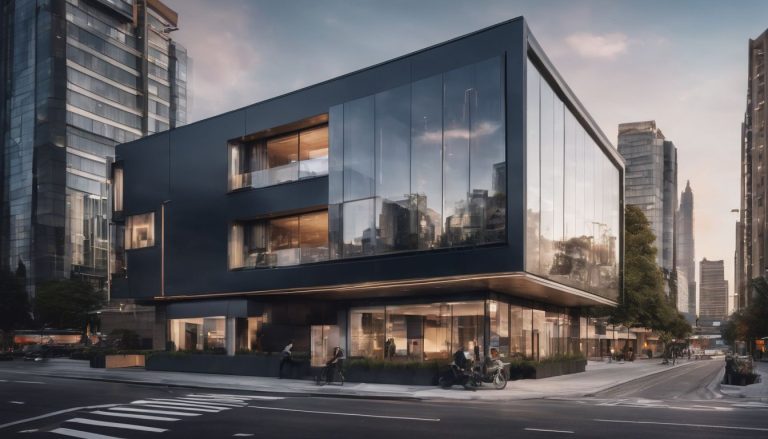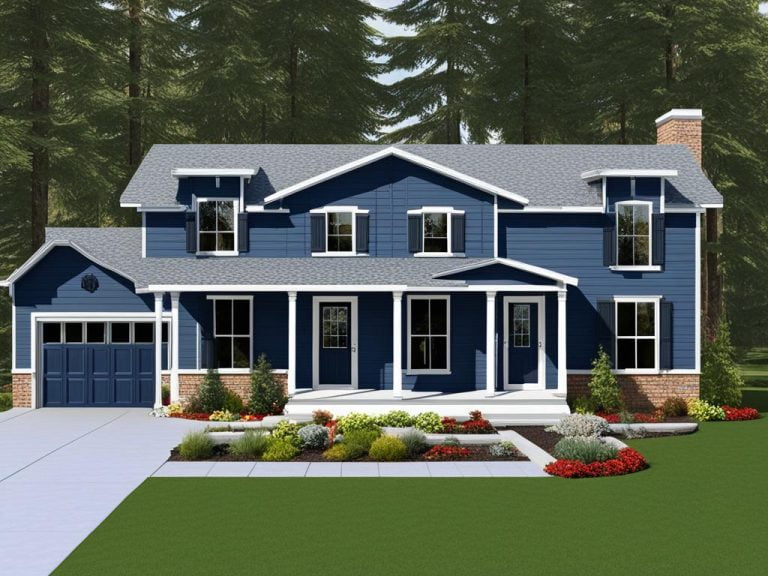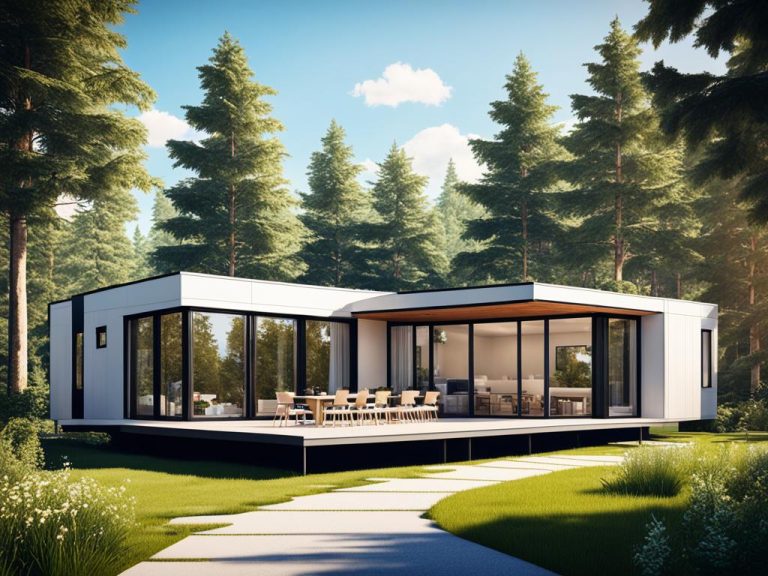Insulating a Prefab House: How and Where for Best Insulation

If you’re looking to make your prefab house more energy-efficient and comfortable, insulating it is an essential step. Proper insulation helps to regulate temperature, reduce energy consumption, and create a sustainable living space. In this article, we will explore the best insulation techniques, materials, and installation methods for insulating a prefab house.
Key Takeaways:
- Insulating a prefab house is crucial for maximizing energy efficiency and overall comfort.
- The choice of insulation material should consider factors such as local climate, building methods, and budget.
- Structural insulated panels, fiberglass, and rock wool are some of the best insulation materials for prefab homes.
- Insulation should be installed in the flooring, wall panels, and roofing to ensure optimal thermal performance.
- Proper installation techniques and considering the recommended R-values for your climate zone are essential for effective insulation.
The Benefits of Insulating a Prefab House
Insulating a prefab house offers numerous benefits, including enhanced energy efficiency and improved thermal insulation. Proper insulation helps to prevent heat from escaping during the winter and keeps the house cool in the summer. It also contributes to a more sustainable and environmentally friendly home, reducing energy consumption and lowering utility bills. With the right insulation materials and installation techniques, a prefab house can achieve optimal comfort levels and indoor climate control.

Installing energy-efficient insulation in a prefab house not only provides thermal comfort but also reduces heat transfer, keeping the house warmer in winter and cooler in summer. By creating a well-insulated envelope, the insulation acts as a barrier, preventing air leaks that can lead to energy loss. This helps to maintain consistent indoor temperatures and reduce the workload on heating and cooling systems, leading to lower energy consumption and utility bills.
Eco-Friendly Insulation for a Sustainable Home
Choosing eco-friendly insulation for a prefab house is not only beneficial for the environment but also for the occupants’ health. Eco-friendly insulation materials, such as recycled cellulose or natural fibers like wool and cotton, are typically free from harmful chemicals and VOCs (volatile organic compounds). These materials are sourced from renewable resources and have a lower carbon footprint compared to traditional insulation options.
Moreover, eco-friendly insulation helps to improve indoor air quality by reducing the presence of allergens and toxins. This results in a healthier living environment and fewer respiratory issues for the occupants. By opting for eco-friendly insulation, prefab house owners can contribute to a greener future while enjoying the benefits of an energy-efficient and sustainable home.
Financial Benefits of Prefab House Insulation
Investing in insulation for a prefab house can yield significant financial benefits in the long run. With proper insulation, homeowners can reduce their energy consumption and lower utility bills. The improved energy efficiency not only saves money but also increases the resale value of the prefab house. Energy-efficient homes are highly sought after in the real estate market, as they offer lower operating costs and increased comfort.
Additionally, some governments offer incentives and rebates for energy-efficient upgrades, including insulation installation. By taking advantage of these programs, prefab house owners can offset the initial insulation costs and further maximize their financial savings.
- Enhanced energy efficiency
- Improved thermal insulation
- Reduced energy consumption
- Lower utility bills
- Increased sustainability and environmental friendliness
Overall, insulating a prefab house provides a multitude of benefits, including energy efficiency, thermal comfort, sustainability, and financial savings. By selecting the right insulation materials and ensuring proper installation, homeowners can create a comfortable, eco-friendly, and cost-effective living space.
Types of Insulation for Prefab Houses
When it comes to insulating prefab houses, there are several types of insulation materials that are suitable for different needs. Each type of insulation offers unique advantages and considerations, allowing homeowners to choose the most suitable option based on their specific requirements.
Structural Insulated Panels (SIPs)
Structural Insulated Panels, commonly known as SIPs, are high-performance and energy-efficient building systems. These panels consist of a layer of insulating material sandwiched between two oriented strand boards. SIPs provide excellent thermal insulation and are easy to install. They are known for their structural integrity and are an effective choice for insulating prefab houses.
Fiberglass Insulation
Fiberglass insulation is a popular choice for insulating prefab houses. It is available in batts and rolls, making it easy to install. Fiberglass insulation provides good thermal insulation and is cost-effective. It is a versatile option and can be used in various areas such as walls, attics, and floors.
Rock Wool Insulation
Rock wool insulation, also known as mineral wool insulation, is highly resistant to fire. It is made from natural materials such as volcanic rock or slag. Rock wool insulation provides excellent thermal and acoustic insulation and is compatible with a wide range of construction methods.
Polyurethane Foam Insulation
Polyurethane foam insulation is known for its excellent insulating properties. It is a spray-applied insulation that expands to fill gaps, creating a seamless and airtight barrier. Polyurethane foam insulation offers superior thermal insulation and can be used in hard-to-reach areas. However, it may have certain disadvantages for certain prefab house applications.
Polystyrene Foam Insulation
Polystyrene foam insulation, commonly known as EPS foam, is another type of insulation material suitable for prefab houses. It is resistant to moisture and offers good thermal insulation. Polystyrene foam insulation can be used in various forms, including rigid panels and foam boards.
Mineral Wool Insulation
Mineral wool insulation is made from glass, rock, or stone wool. It is considered one of the best insulation materials for prefab houses due to its fire resistance and thermal insulation properties. However, it is important to note that mineral wool insulation is not environmentally friendly.

Each type of insulation material has its own advantages and considerations. It is essential to consider factors such as cost, thermal performance, fire resistance, and environmental impact when choosing the right insulation for prefab houses. By selecting the most suitable insulation type, homeowners can ensure optimal energy efficiency and comfort in their prefab homes.
Determining the Right Insulation for a Prefab House
When deciding on the most suitable insulation material for a prefab house, it is essential to consider several factors. The local climate, building methods, and budget all play a significant role in determining the appropriate insulation material. Working together during the design process, builders and homeowners should identify the specific type of insulation required for different parts of the house, including walls, floors, and ceilings.
The amount of insulation needed depends on the size and location of the prefab house. It is crucial to select an insulation material that can withstand the environmental conditions and temperature fluctuations specific to the area being insulated. The chosen material should provide effective insulation and energy efficiency.

Insulation Material Selection
- Consider the local climate when selecting insulation material. For colder regions, materials with higher R-values are recommended to provide optimal thermal insulation. In warmer regions, materials with lower R-values may be sufficient.
- Take into account the building methods used in your prefab house. Some insulation materials may be better suited for specific construction techniques.
- Budget is an important consideration when choosing insulation. Different materials have varying costs, and it’s crucial to find a balance between effectiveness and affordability.
Insulation Installation Techniques
Proper insulation installation techniques are essential to maximize effectiveness and energy efficiency. Here are some key techniques to consider:
- Ensure a tight fit between the insulation material and the walls, floors, or ceilings being insulated. Gaps or spaces can compromise the insulation’s effectiveness.
- Follow the manufacturer’s instructions for installation carefully. Each insulation material may have specific requirements and guidelines.
- Consider hiring professional installers for more complex insulation installations. They have the expertise and experience to ensure proper installation and optimal insulation performance.
By carefully considering insulation materials and employing proper installation techniques, homeowners can achieve effective insulation and energy-efficient prefab houses.
How to Install Insulation in a Prefab House
Installing insulation in a prefab house can be a straightforward process that can be done either by homeowners themselves or by professional installers. The method of installation may vary depending on the type of insulation being used and the specific requirements of the project.
For homeowners who decide to take on the installation themselves, certain insulation types lend themselves to DIY installation. Insulation options such as blankets, boards, and pour-in-place materials are typically more manageable and can be installed without professional assistance.
However, it is crucial to follow the manufacturer’s guidelines and safety precautions when installing insulation. This ensures that the insulation is properly installed and performs optimally in terms of thermal performance and energy efficiency.
If you’re unsure about the installation process or dealing with more complex insulation types like sprayed or blown-in insulation, it is advisable to hire a professional installer. Experienced installers possess the necessary expertise and equipment to handle these materials effectively.
Proper installation techniques are crucial to ensure the insulation fits snugly within the walls and other areas, preventing any air leaks or gaps. Homeowners can evaluate the quality of the insulation installation by measuring the thickness of the insulation, checking for any visible gaps, and ensuring a tight fit around building components.
Remember, for larger projects or areas that require air-sealing services, it may be necessary to engage a certified installer to achieve the best results. Their expertise will guarantee a professional and thorough job, ensuring the insulation provides the desired energy-efficient benefits.

Installing insulation in a prefab house is crucial for energy-efficient insulation.
Conclusion
Insulating a prefab house is essential for ensuring optimal warmth, energy efficiency, and overall comfort. By carefully selecting the right insulation material and considering factors such as local climate and building methods, homeowners can create a highly energy-efficient and eco-friendly living space. The numerous benefits of insulating a prefab house include improved thermal insulation, reduced energy consumption, lower utility bills, and increased sustainability.
With a wide variety of insulation types available, homeowners can choose the solution that best suits their specific needs and preferences. Whether it’s utilizing structural insulated panels, fiberglass insulation, or rock wool insulation, there is an insulation material that can provide the desired level of insulation and energy efficiency. Proper installation techniques and adherence to manufacturer’s instructions are crucial to ensure maximum effectiveness and performance of the insulation.
Insulating a prefab house not only delivers immediate benefits but also represents a sound long-term investment for both the environment and the homeowner. By creating a well-insulated and energy-efficient home, individuals can enjoy a comfortable living environment while minimizing their carbon footprint. So, whether you’re looking to customise your prefab house or maximise its energy efficiency, insulating your home is the key to achieving a sustainable and cost-effective living space.
FAQ
What are the benefits of insulating a prefab house?
Insulating a prefab house offers numerous benefits, including enhanced energy efficiency, improved thermal insulation, reduced energy consumption, lower utility bills, and increased sustainability.
What types of insulation are suitable for prefab houses?
The best types of insulation for prefab houses include structural insulated panels (SIPs), fiberglass insulation, rock wool insulation, polyurethane foam insulation, polystyrene foam insulation, and mineral wool insulation.
How do I determine the right insulation for my prefab house?
When determining the right insulation for a prefab house, you should consider factors such as the local climate, building methods, budget, and specific insulation needs for different parts of the house.
How do I install insulation in a prefab house?
Insulation in a prefab house can be installed by homeowners or professional installers. The installation process depends on the type of insulation material, and it is important to follow the manufacturer’s instructions and safety precautions for proper installation.







In Buffalo, New York, proper insulation is crucial due to the city’s varied climate and
the need for energy efficiency. Insulation Depot USA provides top-notch insulation services, including
attic insulation, wall insulation, and spray foam insulation, ensuring homes and businesses in neighborhoods like Allentown and Elmwood
Village are well-insulated and comfortable year-round. The importance of
reliable insulation cannot be overstated in Buffalo,
where temperatures can fluctuate significantly, making
energy-efficient insulation critical for reducing energy costs and maintaining a comfortable indoor environment.
Insulation Depot USA is located in Buffalo, a city founded
in 1801. Buffalo is a historic city with a population of 276,486 as of 2022 and 118,071 households.
The city is conveniently connected by Interstate 190, a major highway that facilitates easy travel to and from the area.
An interesting fact about Buffalo is its rich history in the development of
the electric power industry, famously associated with Nikola Tesla and the harnessing
of power from Niagara Falls. Today, Buffalo offers a blend of
residential, commercial, and recreational opportunities,
making it an attractive place to live and work.
The cost of insulation repairs and installations in Buffalo can vary depending on the type of service required.
Basic services like attic or wall insulation might
range from $1,000 to $3,000, while more extensive work
such as spray foam insulation or insulation removal can cost between $2,000 and $5,000.
Buffalo experiences a wide range of temperatures, with summer highs reaching around 80°F and winter lows dropping to approximately 20°F.
These temperature variations necessitate reliable and efficient insulation to ensure homes remain comfortable and
energy-efficient throughout the year.
Buffalo boasts numerous points of interest that cater to a variety of tastes and preferences.
Niagara Falls is one of the most famous natural wonders in the world, attracting millions of visitors each year.
The Buffalo and Erie County Botanical Gardens offers a stunning display of plant life in beautiful conservatories.
The Buffalo Zoo, one of the oldest in the country, provides a fun and educational experience for families.
The Albright-Knox Art Gallery showcases an impressive collection of modern and contemporary art.
Lastly, Canalside is a vibrant waterfront district with
a variety of activities, including boating, concerts, and festivals.
Each of these attractions offers unique experiences that highlight Buffalo’s cultural and natural heritage.
Choosing Insulation Depot USA for insulation services in Buffalo is a wise decision for
residents and businesses seeking reliable and efficient
solutions. The company offers a comprehensive range of services, including insulation installation, soundproofing,
and thermal insulation. Insulation Depot USA’s commitment to quality workmanship and exceptional customer service ensures that all insulation needs are met
promptly and professionally. For those living in Buffalo, Insulation Depot USA is the trusted
partner for maintaining an energy-efficient and comfortable living environment,
providing peace of mind and comfort throughout the year.
In Buffalo, New York, maintaining proper insulation is crucial due to the
city’s changing seasons and the need for energy efficiency.
Insulation Depot USA offers essential insulation services such
as attic insulation, wall insulation, and blown-in insulation, ensuring homes and businesses in neighborhoods like North
Buffalo and South Buffalo stay warm in the winter and
cool in the summer. The significance of having a reliable insulation contractor in Buffalo cannot be overstated, as proper
insulation is vital for reducing energy costs and maintaining a comfortable indoor environment throughout the year.
Insulation Depot USA operates in Buffalo, a city founded in 1801.
Buffalo is a historic city with a population of 276,486 as of 2022 and 118,
071 households. The city is well-connected by Interstate 190,
a major highway that facilitates easy travel across the region. An interesting fact about Buffalo is its role in the early development of the electric power industry,
famously associated with Nikola Tesla and the harnessing of power from
Niagara Falls. Today, Buffalo is known for its vibrant community
and diverse recreational opportunities, making it a great place to live and work.
The cost of insulation repairs and installations in Buffalo can vary widely depending on the type of service required.
Basic services like attic or wall insulation might range from $1,000 to $3,000, while more
extensive work such as spray foam insulation or insulation removal can cost between $2,000 and $5,000.
Buffalo experiences a range of temperatures,
with summer highs reaching around 80°F and winter lows dropping to approximately 20°F.
These temperature variations necessitate reliable and
efficient insulation to ensure homes remain comfortable and energy-efficient throughout the year.
Buffalo offers numerous points of interest that cater to a variety of
tastes and preferences. The Buffalo and Erie County Botanical Gardens provide
a stunning display of plant life in beautiful conservatories.
The Buffalo Zoo, one of the oldest in the country, offers a fun and educational experience for families.
The Albright-Knox Art Gallery showcases an impressive collection of modern and contemporary art.
Canalside is a vibrant waterfront district with a variety of activities, including boating, concerts,
and festivals. The Buffalo Museum of Science offers engaging exhibits and educational programs for
all ages. Each of these attractions offers unique experiences that highlight Buffalo’s cultural
and natural heritage.
Choosing Insulation Depot USA for insulation services in Buffalo is a
wise decision for residents and businesses seeking reliable and efficient solutions.
The company offers a comprehensive range of services, including insulation installation, soundproofing, and thermal
insulation. Insulation Depot USA’s commitment to quality workmanship and exceptional customer
service ensures that all insulation needs are
met promptly and professionally. For those living in Buffalo, Insulation Depot USA is
the trusted partner for maintaining an energy-efficient and comfortable living environment, providing peace of mind and comfort throughout
the year.
In Buffalo, New York, proper insulation is essential due
to the city’s varied climate and the need for energy efficiency.
Insulation Depot USA provides top-notch insulation services, including attic insulation, wall insulation,
and spray foam insulation, ensuring homes and businesses in neighborhoods like
West Side and Downtown Buffalo are well-insulated and
comfortable year-round. The importance of reliable insulation cannot be overstated in Buffalo, where temperatures can fluctuate significantly,
making energy-efficient insulation critical for reducing energy costs and maintaining a comfortable indoor
environment.
Insulation Depot USA is located in Buffalo, a city founded in 1801.
Buffalo is a historic city with a population of
276,486 as of 2022 and 118,071 households. The city is conveniently connected by Interstate
190, a major highway that facilitates easy travel to and from the area.
An interesting fact about Buffalo is its rich history in the
development of the electric power industry, famously associated with Nikola Tesla and the harnessing of power from Niagara Falls.
Today, Buffalo offers a blend of residential, commercial, and recreational opportunities, making it an attractive place to live and work.
The cost of insulation repairs and installations in Buffalo can vary depending on the type of service
required. Basic services like attic or wall insulation might range from $1,000 to $3,000,
while more extensive work such as spray foam insulation or insulation removal can cost between $2,
000 and $5,000. Buffalo experiences a wide range of temperatures, with summer highs reaching around 80°F
and winter lows dropping to approximately 20°F.
These temperature variations necessitate reliable and efficient insulation to ensure homes remain comfortable and energy-efficient throughout
the year.
Buffalo boasts numerous points of interest that cater
to a variety of tastes and preferences. The Buffalo and Erie County Botanical Gardens
provide a stunning display of plant life in beautiful conservatories.
The Buffalo Zoo, one of the oldest in the country, offers a fun and educational experience for families.
The Albright-Knox Art Gallery showcases an impressive collection of modern and contemporary art.
Canalside is a vibrant waterfront district with a
variety of activities, including boating, concerts, and festivals.
The Buffalo Museum of Science offers engaging exhibits and
educational programs for all ages. Each of these attractions offers unique experiences that highlight Buffalo’s cultural and natural heritage.
Choosing Insulation Depot USA for insulation services in Buffalo is a wise decision for residents and businesses
seeking reliable and efficient solutions.
The company offers a comprehensive range of services, including insulation installation,
soundproofing, and thermal insulation. Insulation Depot USA’s commitment to quality workmanship and exceptional
customer service ensures that all insulation needs are met promptly and professionally.
For those living in Buffalo, Insulation Depot USA is the
trusted partner for maintaining an energy-efficient and comfortable
living environment, providing peace of mind and comfort throughout
the year.
In Buffalo, New York, maintaining proper insulation is crucial due to the city’s changing seasons and the need for energy efficiency.
Insulation Depot USA offers essential insulation services such as attic
insulation, wall insulation, and blown-in insulation, ensuring homes and businesses in neighborhoods like East
Side and Black Rock stay warm in the winter and cool in the summer.
The significance of having a reliable insulation contractor in Buffalo cannot be
overstated, as proper insulation is vital for reducing energy costs and maintaining
a comfortable indoor environment throughout the year.
Insulation Depot USA operates in Buffalo, a city founded in 1801.
Buffalo is a historic city with a population of 276,486 as of 2022 and 118,071 households.
The city is well-connected by Interstate 190, a major highway
that facilitates easy travel across the region. An interesting fact about Buffalo is its role in the early development
of the electric power industry, famously associated with Nikola Tesla and the harnessing of power from Niagara Falls.
Today, Buffalo is known for its vibrant community and
diverse recreational opportunities, making it a great place to live and work.
Great post. I am facing a couple of these problems.
I got what you intend, appreciate it for putting up.Woh I am glad to find this website through google. “Food is the most primitive form of comfort.” by Sheila Graham.
I am always browsing online for tips that can assist me. Thank you!
It is truly a great and useful piece of info. I’m satisfied that you simply shared this useful information with us. Please keep us informed like this. Thanks for sharing.